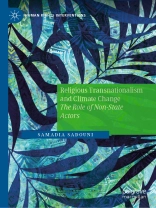This book examines the role of religious actors in the field of climate change and especially in the international mobilization and negotiations to address the issue. It analyzes the mode of action and their discourses on multilateral platforms such as the United Nations Framework Convention on Climate Change (UNFCCC). The international Climate Change Framework Convention is primarily a process that can best be understood by analyzing the various steps taken by the international community, and specifically by different religious groupings, here, in the project manuscript, mainly Christians but also Muslims and Buddhists, in raising environmental consciousness through their programs. The interfaith dimension also plays a major role and needs to be studied in terms of the international realm of international liberal theories based on reciprocity, interdependence and cooperation but also within the framework of Sustainable Development Goals.
表中的内容
1 Introduction: Religious Actors and Climate Change.- 2 New forms of transnational religious mobilisations in context of globalization and cosmopolitanism.- 3 Religion in the field of development.- 4 Religious actions to address climate change: the international platform.- 5 Climate action, religion and civil society in South Africa.
关于作者
Sadouni Samadia is Associate Professor in Political Science at Sciences Po Lyon, Université de Lyon, France, and member of Triangle, UMR 5206 CNRS. Her last book published by Palgrave Macmillan is about transnational religious mobilisation of
Muslims in Southern Africa (Muslims in Southern Africa. Johannesburg’s Somali Diaspora, 2019).












